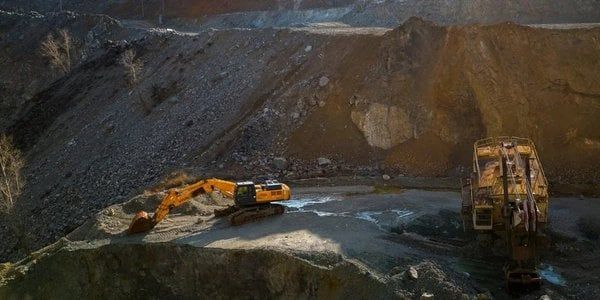
Ukraine possesses significant mineral resources, but their utilization remains extremely inefficient. Instead of becoming a driver of economic growth, this sector faces a number of systemic problems that hinder development and deter investors. The agreement between Ukraine and the US on subsoil use will be no exception. The main problem lies in the state's misguided approach, which treats subsoil resources as a commodity rather than a strategic resource for economic development. Instead of creating a favorable investment climate that would attract a significant number of international companies, the state focuses on selling permits through auctions and concluding PSAs (production sharing agreements). I believe that this approach is wrong. The primary task of the state in the field of subsoil use is not to trade in explored reserves, but to create the most attractive investment climate possible, which in turn will increase the competitiveness of our economy and allow us to attract not only individual international companies to develop already explored reserves, and a significant number of junior companies engaged in geological exploration. The growth of the resource base must at least double the rate of extraction. For example, a $1 increase in mineral extraction leads to a $9.33 increase in gross domestic product in Canada and a $6.53 increase in South Africa.
Moreover, this approach has a number of other negative factors, namely
- Waste of investment. Companies are forced to spend significant funds on acquiring permits instead of investing them in exploration and development of deposits. This increases the cost of extracted raw materials and reduces competitiveness.
- Bureaucratic barriers. The procedure for preparing documentation for auctions is lengthy and complex. Very few permits are put up for auction, which limits access to the market.
- No guarantees. Acquiring a permit at auction does not guarantee protection from problems with local authorities and other factors, which makes investments risky.
- No multiplier effect. This approach does not stimulate the development of related industries, such as mechanical engineering, chemical industry, or high-tech sectors.
The main argument in favor of electronic auctions is their transparency, which should leave virtually no room for corruption. However, the Antimonopoly Committee's appeal against a number of tenders suggests the opposite. Therefore, it is necessary to determine what is a priority for the state: economic growth, or the visibility of the fight against corruption and immediate insignificant income? Why “visibility”? Because corruption in the field of subsoil use is eliminated by a simple concession agreement with clearly defined investment obligations and deadlines. Either a company invests in exploration and development, or another company takes its place. Of course, an effective control mechanism is needed. And it exists—mandatory public reporting by EITI extractive companies. Let me remind you that Ukraine joined the EITI initiative back in 2013. The practice of foreign countries shows that the main role of the mineral resource complex is to provide the country's economic sectors, primarily the industrial sector, with resources for further processing and obtaining the final product. On the other hand, the development of the mineral resource complex tends to stimulate the development of those industries that are suppliers of equipment and materials for extractive enterprises: machine building, chemical industry, high-tech and innovative industries, etc. In other words, the impact of the mineral resource sector on the economy has an inter-sectoral multiplier effect.
At the same time, it should be noted that abroad, one of the factors contributing to the effective development of the mineral resource complex is its use through various financial mechanisms of redistribution and stimulation for the development of knowledge-intensive industries and the social sphere.
For example, economic policy in Canada, Australia, Norway, and, more recently, Saudi Arabia is structured in such a way that proceeds from the sale of mineral resources are specifically used to develop knowledge-intensive industries and support education and healthcare. The mineral resource complex also plays an important role in the development of integration ties between countries, since it is the exchange of various goods, including mineral resources, that ensures the sustainable development of the global economy. At the same time, the experience of foreign countries shows that the mineral resource complex should not develop to the detriment of the national economy—optimal conditions must be ensured between the structure of exports and the industrial development of the country. An analysis of the multiplier effect of the mineral resource sector in the economies of different countries convincingly shows that mineral resources alone are not enough to create a prosperous state. Countries with rich mineral resources adhere to different concepts and are at different levels of economic development and material well-being. In general, only those countries that organize the entire economy of regions rich in minerals around raw material resources, developing a modern production structure with the creation of environmentally friendly technologies and products with high added value, benefit. It is obvious that today, subsoil use in our country is extremely inefficient. This is largely due to excessive regulation, lack of transparency, corruption, and politicization of this industry. Another major problem is “dormant” licenses, whose owners have not developed deposits for years in the hope of successfully reselling them. Although every year we hear about audits of such special permits, the result is zero.
Виходячи з цього, можна сформулювати основні тези щодо реформування системи надрокористування в нашій країні:
- Відкритий доступ до інформації про наявні ділянки та ліцензії через онлайн-систему. Система повинна дозволяти швидко ідентифікувати наявні та реєструвати нові перспективні ділянки й різні ліцензії. Також має бути доступна інформація про проведені раніше геологічні роботи та можливість отримання необхідних даних. (перші кроки вже зроблені, але їх явно недостатньо).
- Заміна чинної системи спецдозволів і УРП на договірну концесійну, з такими видами концесій:
- контракт на проведення робіт із розвідки (сервісний контракт із ризиком);
- контракт на проведення робіт із видобутку (класична концесія);
- контракт про розподіл продукції та контракт на проведення робіт із суміщеної розвідки й видобутку.
- Запровадження спрощеного порядку надання права надрокористування за принципом “Перший прийшов – перший отримав”. Його суть дуже проста: хто першим подав заявку на ділянку надр, той і отримав право на надрокористування. Ніяких аукціонів.
- Законодавча можливість застави прав концесіонера у сфері надрокористування. Така застава має бути можливою виключно з метою залучення фінансових ресурсів для здійснення операцій, визначених концесійною угодою.
- Розробка й ухвалення нового, прогресивного Кодексу “Про надра”, при цьому суттєве зменшення кількості регламентуючих документів.
- Стимулювання вітчизняних та іноземних інвесторів шляхом фіксації оптимального податкового навантаження та правил на тривалий період (до 10 років.). Це надасть інвесторам впевненість у майбутньому і стимулюватиме довгострокові вкладення.
Україні необхідно відійти від моделі «миттєвого доходу» і перейти до системного підходу, спрямованого на розвиток економіки в цілому. Тільки так надрокористування зможе стати потужним джерелом зростання та добробуту.


